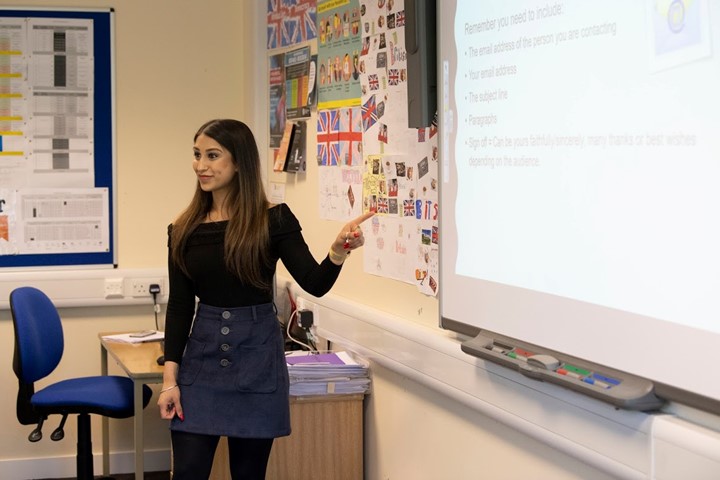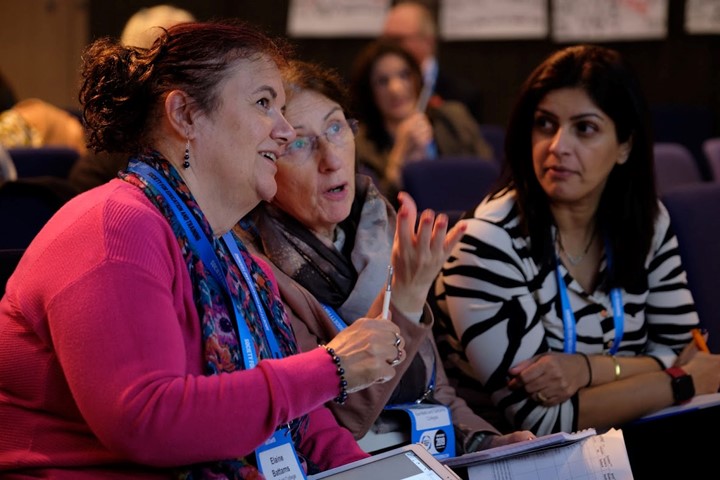
#UKFEChat Lockdown support and advice for teachers and trainers in 2021
When the new lockdown started at the beginning of 2021, it felt quite different to the first one in March last year, writes Sarah Simons, Matron of #UKFEChat on Twitter.
Back then, although times were tough there seemed to be a certain amount of energy, perhaps powered by the collective astonishment that the whole world was experiencing something new.
The novelty has since worn off, leaving many of us struggling to recognise anything ‘normal’ in what is widely described as ‘the new normal’. Lots of people are experiencing difficulties in managing their work, families, finances, relationships or health, both physical and mental.
But there is some comfort in knowing that lots of us are encountering similar problems, and that none of us are alone in finding this time tricky. And it’s great to know that there are numerous avenues of support already available - whether it's a Twitter hashtag that gathers a community with specific interests, a colleague who uses his lunch hour to help solve remote learning tech troubles, or a fantastic set of free resources ready to use in an online teaching session.
If there was ever a time to get involved with an online community of colleagues and friends, to give or to receive support, then this is it.
#UKFEChat: What support do you need and what's already out there?
On 7 January a Twitter #UKFEChat took place on the theme ‘What support do you need and what’s already out there?' Many of you came together to help find ways to help and support each other during this difficult, confusing, and unpredictable times. Below are the highlights taken from the live event.
Swap shop – free resources and advice
- Tom Starkey (@tstarkey1212) is offering help on remote learning from 12-1pm daily on Twitter, covering Teams, Blackboard Collaborate, tech tools for disabilities, accessibility tools, and more.
- Join in with #ReflectConnect with Annie Pendrey (@AnniePendrey) on Fridays to share reflections, link with others and discuss practice/development
- All FE staff and students can get free access to Mindbox’s online therapy centre until April 2021. Co-founded by TV presenter and journalist, Anna Richardson, Mindbox has partnered with TOTUM to support UK students affected by the Covid-19 pandemic by offering free access to mental health support to help manage and overcome stress, anxiety, performance nerves, panic attacks and more.
- @idea_award/iDEA.org.uk is used by almost 1m people to learn digital, enterprise and employability skills. In doing so you can collect digital badges and points which count towards awards.
- Check out these video resources from CanDoCourses.
- @LauraKeyes runs free 30-minute yoga sessions for students.
- The Practical ESOL Tutor blog by @LtutorEso shares advice and ideas she has prepared for her students, including how to have a virtual field trip.
Q&A about lockdown experiences, tips, and advice
- “This time around there is no sense of excitement/novelty just “Here we go again”. The learners seem more tired and fed up than in March 2020. The time of year and weather doesn’t help!”
- “The mojo! Motivation is being zapped by the many last minute decisions for them I guess and they must miss the socialisation aspect of their education.”
- “I think the season has an impact; dark mornings and it gets dark early.”
- “In terms of classes for my curriculum areas, it's been largely business as usual as we never came off-line. However, the impact emotionally is huge. We are seeing a lot more cases of Covid, it's winter, and people have less reserves.”
- “The goalposts keep moving. Staff don't actually know what we ought to be doing by when (Government changes). Students know what it is about this time and no longer have any hope but go through the motions. It's much, much tougher all round.”
- “I think it’s a bit of "Oh here we go again", is there no light at the end of this tunnel? But we are taking lessons learnt and implementing and ensuring we work as a team to support each other.”
- “For me, I have more work to do so it's even harder to juggle with home schooling. Learners much more ready to jump into fully online, having done blended since September. Not sure I can speak for colleagues yet.”
- “I am living my life through Zoom and Microsoft teams.... but I’m still alive.”
- “We are going ahead with mock exams next week, but online. It feels impossible, but if we stay firm and stay focused, then they believe that their education very much still matters. We are giving out Chromebooks. We are providing support hubs. We are keeping on.”
- “Giving the time and space for the learners to share their feelings. I have found this week that tutorials have become very important and time in my meets to just chat with the learners about everyday things.”
- “Most of my learner are retired, so are carrying on as usual. I'm more concerned about their mental health, as many of them live alone. We have free mental health courses and mental health support in place for staff and learners plus just listening helps.”
- “Constant informative communication and checking they are okay.”
- “By being present, answering messages as promptly as I can, opening up lines of communication, acknowledging how hard it is but keeping on smiling. We're all in it together.”
- “Sense of community and just being there... reaching out and connecting. Being positive and annoyingly persistent in showing you really care about them and their studies, and offering activities that help them one-to-one.”
- “Reiterating to students how far they have come and the resilience and hard work they have shown in the last few months. My students had an exam today and some also have it on Monday. All their teachers and myself will be with them in their learning journey every step of the way.”
- “I have said that we will make sure that you have the best education that we can give you alongside full support. We understand how stressful this is for students and will do as much as we can to support them so that they can progress well, achieve and do well after their studies.”
Top tips in brief
- Give time and space for the learners to share their feelings.
- Give time to chat with learners.
- Provide support hubs.
- Mental health courses and mental health support for staff and learners.
- Constant informative communication.
- Answering messages as promptly as possible.
- Providing a sense of community.
- Being positive and persistent in showing you care about them and their studies.
- Reiterating to learners how far they have come and the resilience and hard work they have shown in the last few months.
- “As my taught sessions are in the evening and my work is all freelance, I've decided that I'm going to change my awake hours to get up at 10am and go to bed at 2am. I'm not good getting up and I write better at night so why not? My 16-year-old is already on those hours!”
- “Stay off Twitter so I can focus on my girls not my phone, thick black line for my working hours (out of office set up), go outside every day, try and eat a healthy lunch because left to my own devices I'd live on cheese sandwiches. I've broken the Twitter one this morning! Last time it was very much 'do what you can', whereas this seems to be business as usual. My youngest is five so I have got to carefully balance everything, especially as I'm teaching as normal but online. I've also still got a 10,000 literature review to write!”
- “A rule I have made myself is to not eat biscuits as snacks. I've been good so far. Rule broken already is to not drink alcohol on a school night!”
- “Not rules but affirmations 1. To eat a rainbow 2. I would love to break the rules and hug my parents, but I won’t. I miss them so much.”
- “I suspect that the rule I will break will be not exceeding work hours sadly, but only for my learners and my team, never for admin! It's always a difficult balance, because my own mental health is important too, but my job is first and foremost to support others.”
- “No rules! No beating myself up. No feeling guilty. Let my children be happy and free (within safety and lockdown reason). Listen to students rather than implementing standard punishments. Scrap homework!”
Top tips in brief
- Change working hours to suit when most productive.
- Stay off social media to focus.
- Go outside/take a walk every day.
- Eat healthily.
- No rules! No feeling guilty and no beating yourself up.
- Listen to students rather and implementing standard punishments.
- Be adaptable and now phased by anything.
- Be resilient and philosophical.
- Stay off the phone in the evening.
- “Look for positives, and potentially a new idea to try.”
- “I like the idea of encouraging the learners to be more creative at home and being positive is essential.”
- “A reminder that spring is coming, look for signs of better times ahead, slightly lighter evenings. A reminder that nothing is normal right now... there is no FOMO (fear or missing out). We are in it together and can support each other too.”
- “Doing something creative. I enjoyed putting my bullet journal together tonight and crochet has helped me wonderfully. Also, an afternoon stamping Christmas cards in December and taking a lunch break.”
- “I've signed up to a fitness challenge. It is doable. I can change it up or give myself more time, and there's a medal too. Plus it forces me to switch off and get away from screens.”
- “For me it’s taking my dog for a walk - wouldn’t know what I would do with put him motivating me to leave the house! I have started trying to say three things I am grateful for each day though - end the day on a possible.”
Top tips in brief
- Get outdoors every day, whatever the weather.
- Try out new ideas.
- Be creative at home.
- Set yourself fitness challenges.
- Look ahead to better (and warmer) days.
- Look for the positives.
- “I set up a children's university online group, a culture club and a free book library, which is an online community, as well as swapping books with local folk contact free from my driveway.”
- “I didn't start anything new myself (unless you count learning new technology), but music seems to have been the greatest help throughout lockdown 1. Just thinking back to people playing instruments on Italian balconies, free WestEnd musicals on the TV.”
- "I started #Couchto5K and never in a million years did I think I would enjoy a jog, but I'm still jogging along in lockdown 3.
- "Not creative or even a new interest, but in 2020 I walked 2,000 miles. For 2021 I will be happy if I reach the 1,000 miles target."
- “I think I'd tell myself not to worry about whether I'm being super-productive every day or not. If I have a day(s) where I only just reach minimum expectations of being a person, that's okay.”
- “I think I would tell myself to not rush in head first. We worked harder, not smarter most of the time, because we were in such a rush to get everything in place. Reflection is everything.”
- “Don't be locked down to your computer 24/7 - move around! Walk!”
- “Don’t be afraid to try new things, always stay positive and don’t make banana bread!”
- “I’d tell myself, none of it’s going to be perfect, a lot won't even be ‘good’, but just do your best.”
- “Maybe to learn to say "No" more often - you can't do all the things and be all the things. Focus on the people that you care about, both at home and at work.”
- “Relax... the job has never looked like this before, don’t judge your abilities against your usual classroom self-expectations.”
- “I’d say, 'Trust me on this one. Stop drinking coffee now. It’ll make such a difference'. I suspect March me would pull a face at such advice, but he’d soon realise I was right.”
Top tips in brief
- Don’t worry about having to be super productive every day of the week.
- Don’t rush in head-first.
- Don’t get stuck to your computer and move around!
- Don’t be afraid to try new things.
- Try to stay positive.
- Learn to say no more often – you can’t do everything.
- Focus on the people that you care about, both at home and at work.
- Don’t judge your abilities against your usual classroom self-expectations.
- “Never mind planning a trek to foreign shores or even to Snowdonia get a book to support an exploration of your local environment.”
- “Make sure you get outside (in a safe way of course). It will help your brain, it will give you ideas, it will unblock a problem and you might see a cute animal. If you have to be indoors, watch Midnight Diner on Netflix.”
- “Switching off tech for a whole weekend. I spent a weekend decorating my office in August - no TV, no PC, no phone (well except for voice calls), just good music and a paint brush. I felt so much better afterwards.”
- “We've just started to share local walks with a learning/thinking semi CPD as part of the #mtptproject #walkforCPD. There is so much amazing history literally on my doorstep which I can share with my children/partner. Outside/learning/family/no pressure!”
- “Close the laptop at 5pm at the latest. Don’t watch the news!”
- “Something which helped me and might help others was coming across the poem Everything Is Going To Be Alright by Derek Mahon, which I first read in October, just after the poet’s passing. I think it’s lovely.”




